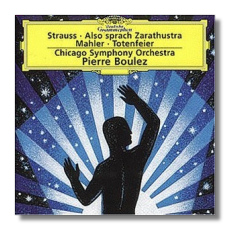
The Internet's Premier Classical Music Source
Related Links
- Latest Reviews
- More Reviews
-
By Composer
-
Collections
DVD & Blu-ray
Books
Concert Reviews
Articles/Interviews
Software
Audio
Search Amazon
Recommended Links
Site News
 CD Review
CD Review
Also sprach Boulez

- Richard Strauss: Also sprach Zarathustra
- Gustav Mahler: Totenfeier
Chicago Symphony Orchestra/Pierre Boulez
Deutsche Grammophon 457649-2 DDD 58:45
Deutsche Grammophon taped these performances three years ago; their delayed release, however, should not be interpreted as a sign of any artistic or technical shortcomings, because these are top-of-the-line readings of Strauss's and Mahler's scores in every way.
The Chicagoans are no stranger to Also sprach Zarathustra. It has been about 40 years since Fritz Reiner conducted them in this score for RCA Victor, and I wonder how many of the musicians from those recordings also appear on this one. Things have changed a lot since then, and although no one would confuse Boulez's work with Reiner's on a police line-up, Boulez's reading is just as valid and satisfying as Reiner's. The Frenchman rejects producing a crushing wave of sound in favor of injecting space and light into Strauss's thick textures. No doubt Deutsche Grammophon's engineers assist him in achieving this effect, but no amount of knob-twiddling and microphone placement can compensate for woolly musicianship, and Boulez proposes anything but. In spite of the transparency of this conductor's approach to the music, there is no shortage of power in his Zarathustra, and the big climaxes are truly colossal. Boulez resists the temptation to pull the music's tempo back and forth in search of obvious or tawdry effects, and that is another powerfully attractive aspect of this reading. There is much for Boulez and the Chicagoans to be proud of here.
Totenfeier (Funeral Rite) is an early version of the first movement of Mahler's Second Symphony. Mahler completed it in 1888, several years before he finished the symphony. Mahler's inspiration was a poem by the Pole Adam Mickiewicz in which a sensitive young man kills himself after his sweetheart has married someone else; in consequence, he is doomed to eternal, mute wanderings in her presence. Mahler also was inspired by a morbid vision of himself "lying dead upon a bier under wreaths and flowers" following the successful première of Die drei Pintos, an opera that Mahler had constructed from sketches by Carl Maria von Weber. Totenfeier differs from the symphony's first movement in several small but significant ways. In the intervening years, Mahler tightened up the music by removing a bar here and a few bars there, and by the refining the orchestration. A casual listener might not even notice the differences. Mahler's revisions were all for the best, but Totenfeier still packs a tremendous wallop. If nothing else, it "gives permission" for an orchestra to program a chewable chunk of Mahler that many audiences would not otherwise digest. Boulez conducts it with an ear for its timbral transparency, and he gives its fatalistic emotions their dark due. The only complaint I have is that now I want to hear Boulez conduct the entire Second Symphony. Excellent work.
Copyright © 1999, Raymond Tuttle


















